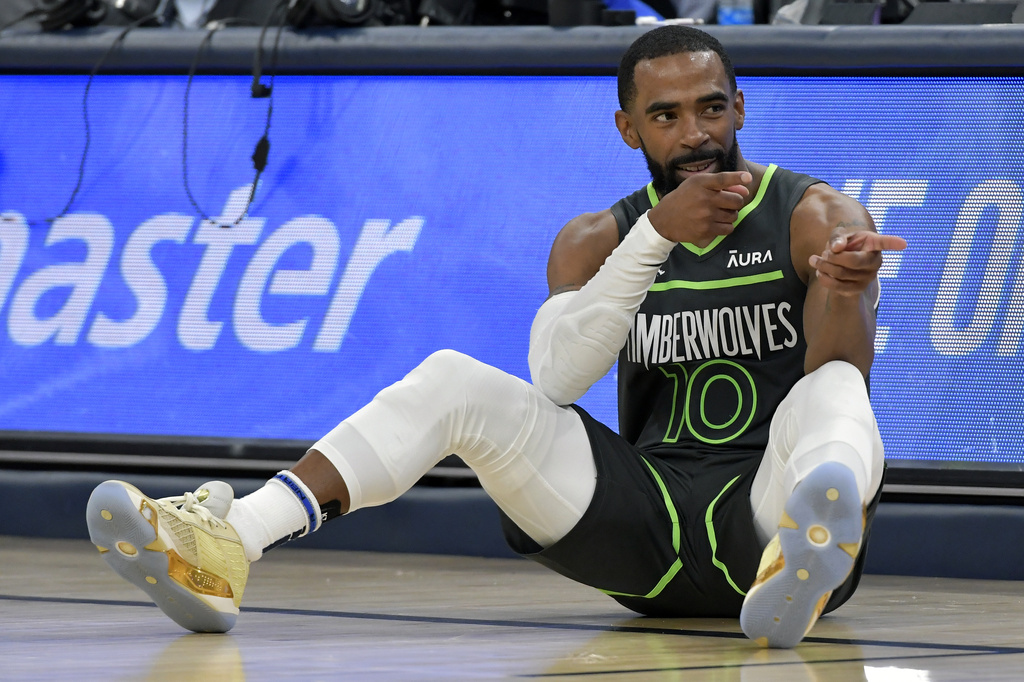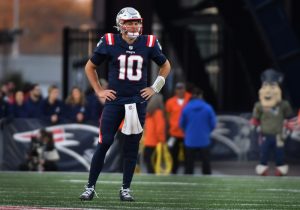
Conley’s Corner: Timberwolves guard is the ultimate sportsman
EDITOR’S NOTE: Mike Conley is one of the best sources of information in the NBA.
Entering his 17th NBA season, the 36-year-old Timberwolves point guard has seen it all, and has the knowledge and willingness to explain what’s taken place and what’s to come with the media and, thus, the fans. That breadth of insight and analysis extends from the on-court Xs and Os to team dynamics and development.
Conley is just as good at explaining why two teammates came to blows in the middle of a timeout as he is on what the team needs to do to decode a switch-heavy defense.
So who better to sit down with twice a month to tackle different topics ranging from the Timberwolves to the league at large to, well, Mike Conley, than Conley himself.
This is the fourth installment of Conley’s Corner.
The Ultimate Sportsman
Grizzlies guard Desmond Bane grabbed a defensive rebound and started making his way up the floor in the third quarter of a contest Sunday in Memphis.
A couple minutes prior, Bane dipped his shoulder and trucked Naz Reid, earning himself a flagrant foul. Memphis is in the midst of a rough start to the season, and Bane was clearly getting chippy amid another blowout defeat.
As he started to dribble up the floor, Mike Conley was trailing closely behind. Bane tried to throw his body back into Conley.
“I took the hit, used my brain and flopped a little bit and got the charge immediately,” Conley recalled.
As the officials blew the whistle on the charge, Conley turned his body and pointed in the Timberwolves’ direction, signaling Minnesota basketball. That is the Mike Conley way of reacting when an opponent gets out of line.
“I think that gets people more than saying any words. Anybody can say anything they want and (when) it doesn’t do nothing to (the opponent), and they know, ‘Man, I can’t really get to him,’” Conley said. “And next thing he knows, (the opponent) hits a three, taps you on the side of the leg and keeps moving. That’s the best way of accomplishing that fight.”
It’s just not a way in which many others can operate, particularly in the athletic arena, where competitive juices flow and emotions run high. But Conley makes a point to handle his on-court interactions in the same way in which he’d act in everyday life.
“I can be in the middle of a playoff game and helping other players up or be talking to them on the way down (the floor saying), ‘Tough shot.’ And in my head I’m thinking to myself, ‘That (shot) was lucky.’ And they might know that, but I’m constantly just killing them with kindness, as opposed to the opposite,” Conley said. “You can be the guy who’s the antagonist, just really after people, yelling at them, trying to get in their head and stuff. But I get in their head a whole other way. If I pat them on the back like, ‘Man, that was tough.’ They’ll be like, ‘What, why are you saying that to me right now? We’re in the middle of a game. I don’t know you.’”
So, in some ways, maybe it’s part of a mental game. But it’d be difficult to sustain such a shtick over the course of a 17-year career. In reality, that’s who Conley is. When he entered the NBA, he saw how players felt the need to act out of character to make money or show value to their team.
“I never wanted to be that guy that was one person off the court and then on the court you’re this devil child acting crazy. I was like, ‘I’m going to be the same if you see me on the court as if you see me off the court,’” Conley said. “I’m going to compete the same if I’m playing a video game or on the basketball court. I’m going to talk to you the same way as if we’re having a conversation.”
His rare approach has been recognized time and time again. In July, Conley was named the Joe Dumars NBA Sportsmanship award for the 2022-23 campaign, marking the fourth time he’s received the honor – the most in League history. It’s a rare combination that one of the League’s top players over the past 15 years is also the person who’s carried himself the best.
“I believe there’s a misconception of what tough is and what it’s supposed to be, and what competitiveness is,” Conley said. “People think that you’re supposed to be bloodying people up, and if you don’t do that, you don’t care. I care more than, I guarantee you, probably everybody on this team does about winning, and I don’t have to show it in that manner. I’m going to do it in my own way.”
His way is a product of the people he grew up with and around. If there’s been an equally as kind player in the NBA, it may have been Greg Oden, who was Conley’s teammate and friend growing up. Conley also points to the impact his parents had on him. He called his dad a “super competitive” guy who was never one to celebrate when winning anything when Conley was growing up.
“It was like, ‘I’m supposed to do that,’” Conley said. “So my first playoff win, I wanted to jump around and celebrate with everybody, but it’s like, ‘It’s one win. We’ve got to win 15 more to win a championship. What are we trying to do?’
“My mind has always been, ‘The job is not done. It’s just a game. We’re supposed to be here, supposed to do that, supposed to win.’ So it’s hard for me to fall into the moments and celebrate them as much as I should. I think that’s allowed me to have that even keel all the way through, because you don’t get too high or too low, because you always know there’s something else.”
That doesn’t mean Conley doesn’t enjoy the victories along the way. When he returned home Sunday night after Minnesota’s win in Memphis, he reiterated to his wife that “there’s literally no better feeling than winning.”
“Like I can sleep good,” he said. “It’s the complete opposite when you lose. Now I’m running through plays in my head and I can’t get over this and that. So there’s a distinct difference between the two and it might be while I’m still playing, because I’m addicted to that feeling of success and an accomplishment of something I just did. But it keeps me going.”
Yet it never turns him into someone he’s not. Perhaps Conley’s most impressive statistic amid his illustrious career is that he’s never received a technical foul – not one. He’s a calming force on a team that collected technical and flagrant fouls a year ago as if they were baseball cards.
Conley will not lash out in reaction to what he believes is an injustice. He thinks, then he acts. Thus, he’s able to deliver his argument in a respectful, more effective manner.
“I have this ability inside of me somehow to believe in this deeper karma situation where if a ref misses three straight calls, I want to go out there and just grab them by the jersey in my mind and I’m just feeling like so mad. But at the same time, (I know) good will come to good. It’s going to come right back to me. I already know. It’s got to, it’s got to,” Conley said. “I just keep telling myself that and it calms me down. Like inside, I might be boiling, but (I know) that’s not supposed to happen. They know it, the universe knows it, God knows it. It’s going to work out for us, don’t even worry about it. So I’ve always been able to keep the same level, at least on the outside, and not let it out.”
Plus, Conley described himself as empathetic. He’s always trying to feel out the entirety of a situation before reacting. It makes him an effective parent, as well.
“Exactly. I feel like I’ve got that in me where I can sift that out pretty good, and I don’t tend to blurt out something right away,” he said. “I’ll assess the situation and go from there.”
He’s adept at reasoning with others – at least those he can reason with. He noted if anyone sees him get legitimately mad, it’s his kids. There is often no reasoning with young children.
“My kids see me the most mad, that’s about it – my kids and my wife when the kids are acting up or they don’t listen or they do something they’re not supposed to,” Conley said. “Then I kind of get a little bit more parenting mad. Even then, I’m probably a little bit more on the relaxed side than others.”
So even they probably wouldn’t “T” dad up.
Conley enjoys that the positive way with which he carries himself has become such a major part of his reputation and identity.
“It’s cool that you get recognized for something that you didn’t necessarily have to tell everybody about or post about or put in front of people all the time. Like, this is who I am,” Conley said. “You either like it or you don’t. I’m glad that people have taken a positive look at it.”
But he does have one gripe re: that sportsmanship award..
Related Articles
Timberwolves’ Nickeil Alexander-Walker proves his value by playing in the present
Timberwolves blitz Jazz in second half for another home victory
Chet Holmgren called trip back to Minnesota ‘a blessing’
In the short term, these Timberwolves would be just fine without Anthony Edwards
Anthony Edwards injured as Timberwolves top Oklahoma City in matchup of West’s top teams
“I should win it every year to be honest,” he said with his patented smile. “I don’t think there’s anybody like me that exists out there anymore.”
One of a kind, indeed.


